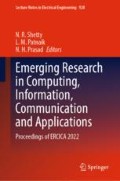Abstract
Several monumental vicissitudes have occurred in IC design industry in various fields of electronics. The challenge of circuit design is addressed by numerous multifaceted optimization approaches such as the technology castoff for the implementation of design, the topologies in realization, the circuits, architectures and algorithm. Therefore, in product development, the trade-off exists between area-power-speed and optimal ASIC library. This work reveals a paradigm of GDI library creation which supports for designing combinational and sequential logic circuit for low-power and high-speed applications. This work demonstrates four different GDI library pattern creations with and without level restoration circuits. The experimentation was done using Silterra 130 nm process mentor graphics Pyxis software and the parameter like rise time, fall time, delay power and dynamic power have been analysed. These four library cells are compared with the existing counterpart CMOS technology and reveal the significant improvement in terms of transistor count, delay and power.
Access this chapter
Tax calculation will be finalised at checkout
Purchases are for personal use only
References
Geetha S, Amritvalli P (1019) Design of high speed error tolerant adder using gate diffusion input technique. J Electron Test 10836–019–05802–2, May 1019
Kishore P, Koteswaramma KC, Chalapathi Rao Y () Design of High Performance Adder Using Modified Gdi Based Full Adder. J Mech Cont Math Sci 15(8)
Sarkar S, Chatterjee H, Saha P, Biswas M (2020) 8-Bit ALU Design using m-GDI Technique. In: Proceedings of the fourth international conference on trends in electronics and informatics (ICOEI 2020) IEEE Xplore Part Number: CFP20J32-ART, pp 17–22
Morgenshtein A, Fish A, Wagner IA (2002) Gate-diffusion input (GDI): a power-efficient method for digital combinatorial circuits. IEEE Trans Very Large Scale Integr (VLSI) Syst 10(5):566–581
Uma R, Dhavachelvan P (2012) Modified gate diffusion input technique: a new technique for enhancing performance in full adder circuits, 2nd International conference on communication, computing and security [ICCCS-2012]. Proc Technol 6:74–81
Amini-Valashani M, Mirzakuchaki S (2020) New MGDI based full adder cells for energy-efficient applications. Int J Electron. https://doi.org/10.1080/00207217.2020.1818296
Praveen Kumar YG, Kariyappa BS, Shashank SM, Bharath CN (2020) Performance analysis of multipliers using modified gate diffused input technology. IETE J Res. https://doi.org/10.1080/03772063.2020.1782778
Shoba M, Nakkeeran R (2016) GDI based full adders for energy efficient arithmetic applications. Eng Sci Technol Int J 19:485–496
Morgenshtein A, Fish A, Wagner IA (2002) Gatediffusion input (GDI)-a power-efficient method for digital combinatorial circuits. IEEE Trans VLSI Syst 10(5)
Rabaey JM, Chandrakasan A, Nikolic B (2002) Digital integrated circuits In: A design. 2nd 2002, prentice Hall, Englewood Cliffs, NJ
Ponnian J, Pari S, Ramadass U, Pun OC (2021) A new systematic GDI circuit synthesis using MUX based decomposition algorithm and binary decision diagram for low power ASIC circuit design. Microelectron J 108:104963
R.Uma, Ponnian J, Dhavachelvan P (2017) New low power adders in self resetting logic with gate diffusion input technique. J King Saud Univ Eng Sci 29(2):118–134, April 2017, Elsevier
Uma R, Dhavachelvan, P (2012) Modified gate diffusion input technique: a new technique for enhancing performance in full adder circuits, international conference on communication, computing and security (ICCCS-2012). Proc Technol 6:74–81, September 2012, Elsevier
Uma R, Vigneshwarababu P, Nakkeeran R, Dhavachelvan P () New low-power reversible logic gates using gate diffusion input technique. In: International conference on emerging research in computing, information, communication and applications, ERCICA-2013, pp 31–36
Author information
Authors and Affiliations
Corresponding author
Editor information
Editors and Affiliations
Rights and permissions
Copyright information
© 2023 The Author(s), under exclusive license to Springer Nature Singapore Pte Ltd.
About this paper
Cite this paper
Ponnian, J., Pari, S., Ramadass, U., Pun, O.C. (2023). A Unified Libraries for GDI Logic to Achieve Low-Power and High-Speed Circuit Design. In: Shetty, N.R., Patnaik, L.M., Prasad, N.H. (eds) Emerging Research in Computing, Information, Communication and Applications. Lecture Notes in Electrical Engineering, vol 928. Springer, Singapore. https://doi.org/10.1007/978-981-19-5482-5_36
Download citation
DOI: https://doi.org/10.1007/978-981-19-5482-5_36
Published:
Publisher Name: Springer, Singapore
Print ISBN: 978-981-19-5481-8
Online ISBN: 978-981-19-5482-5
eBook Packages: Computer ScienceComputer Science (R0)

